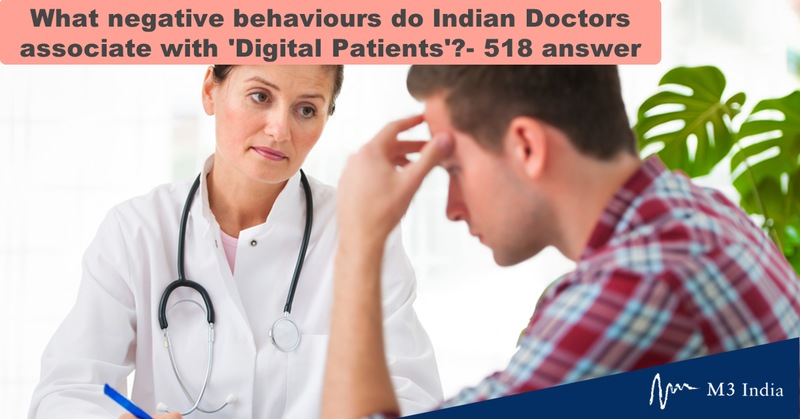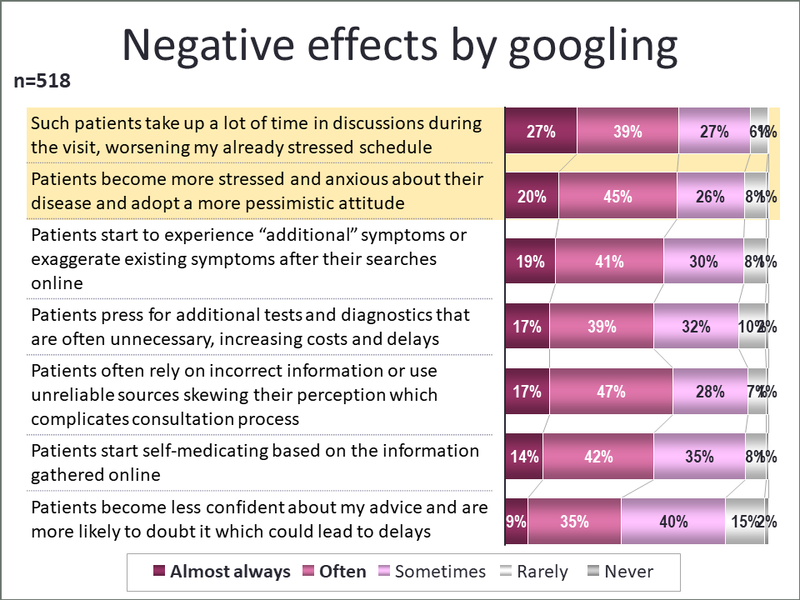What negative behaviours do Indian Doctors associate with 'Digital Patients'?- 518 answer
M3 India Newsdesk Sep 26, 2018
M3 India conducted an online survey to understand what doctors had to say when patients bring internet-based health information to the consultations. In Part 3, respondents pick from a list of negative patient behaviours which they most commonly associate with internet-informed patients.

As the use of the Internet as a source for health-related information becomes more commonplace, relations between the patient and physician can become strained. We had 518 doctors responding to this survey questionnaire. Doctors also shared anecdotes along with their opinions.
The study suggests that doctors have devised their own ways to deal with such patients.
Interestingly, a participant (Endocrinologist, 40 to 49 years) says,
“When confronted by internet-based incomplte information, I ask such patients to accompany me on a helicopter as I've learnt piloting online yesterday. Now they realise where they stand.”
Negative effects of dealing with digital patients*

Eats into the consultation time
- 66% doctrs responded saying that this was the most common negative after effect they associate with internet-informed patients and believe that such patients take up a lot of time in discussions during the visit, worsening the already packed schedule
- 27% of the doctors believed that though not always, this is sometimes seen as a negative effect
Adds to stress and anxiety of the patient
- 65% doctors believed that acess to disease information via internet leads to a pessimesitic attitude in the patient towards his disease as it adds to stress and anxiety of the patient
Online searches lead to exaggeration of the existing symptoms
- 60% of the responding doctors felt that patients resorting to online searches about their health often exaggerrated their symptoms as they falsely start to experience all that is read
A senior physician, (50 to 59 years) said,
“Almost every internet-informed patient with headache thinks he has brain tumor.”
Demand unnecessary diagnostics
- 56% of the responding doctors agreed that patients reading about their health conditions online demand additional tests that are not only unnecassry but also delay and add to the cost of treatment
- 32% doctors believed that this sometimes emerged as a negative trait
- 12% responded saying that this was never a problem
A respondent (Cardio-thoracic surgeon, 60 to 69 years) writes
“Often the patients ask for procedures that are on trial without adequate follow up of results. When they are adviced against a procedure that they may have come to know through the media. They think that the doctor is not upto date or an old timer and move on to another doctor.”
Incorrect, unrelaible information skews perception and complicates consultation process
- 64% of the responding doctors felt such patients are misinformed and tend to complicate the consultation process
- 28% feel that, though not always, they sometimes see this as a negative point. One of the respondents, a dermatologist, explains the drawback of internet mis-information.
She explains with an example that patients with hairloss demand treatments that they have come across on the internet and without understanding the results or efficacy of this procedure, admantly demand the procedures. She mentions that such patients are difficult to manage
Patients start self-medicating based on the information gathered online
- 56% doctors believe that self medication is a negative aspect of internet savvy patients as it leads to confusion, distress, or an inclination towards detrimental self-diagnosis and/or self-treatment
A respondent (Pulmonologist, 40 to 49 years) shares an unfortunate incident:
“My patient, a smoker in his twenties, came with occasional smoker's cough and phlegm, was diagnosed with mild bronchitis and it wasn't serious. Unfortunately, this patient began to Google his symptoms, and diagnosed his own condition as COPD. He also read about the long-term complications of COPD. At follow- up visits, he seemed depressed and kept saying he was going to die of respiratory failure, spending his last days on a ventilator in the ICU. We tried hard to convince him that this was not the case, but he was in no mood to listen. One day I heard he had lost his job, as he was not going to work anymore. He became obsessed with his so-called disease, finally landed up with a psychiatrist!”
- 35% doctors feel that, though not always, sometimes self-mediation based on internet mis-information can be detrimental
Patients become less confident about advice and are more likely to doubt it which could lead to delays in care
- 44% doctors believe that ptients who read about their health conditions proactively on the internet are less confident about their doctor’s advice which may result in delayed treatment
- 40% of the doctors sometimes feel that this is a negative effect
An obstetrician from the survey says,
“Dr Google has made it hard for us to practice medicine in our own way. Patients end up chugging toxic alcoholic beverages and inhale noxious fumes, by will, but will hesitate to take a pill we doctors prescribe and check twice, if not thrice with Dr. Google, who's opinions I will say are biased as there are a lot of useless quacks writing terrible nonsense out there."
Another gastroenterologist shares an experience with a patient and rues the fact about treatment delay, he says,
“I had one patient of perianal abscess.. I suggested surgery.. however patient believed Google doctor and preferred to wait... ultimately he ended with spontaneous rupture later with fistula and prolonged morbidity.”
Physician Strategies
Some doctors have opted for their own ways and strategies in order to cope with Internet health information introduced by patients during medical consultations. One of these strategies included recommending reliable websites.
In this survey we asked the respondents to name a few websites that they recommend to their patients, albeit selectively, for understanding their condition. The doctors mentioned WHO, CDC, GOI website, Medsacpe, WebMD, Cleveland Clinic, and NHS patient education. Some other doctors prefer sharing print outs from websites that they trust in.
To read Part 1 of the survey, click What do Indian doctors think about 'Digital Patients'?- 518 answer
To read Part 2 of the survey, click Do Indian Doctors see benefits with ‘Digital Patients’?- 518 answer
*This data should be read as indicative of rather than exact figures.
Disclaimer: We have presented the data and facts as they are without generalizing the results as a reflection of the views of entire Indian doctor population. The demographic profile of the survey participants [shown above] may differ from the population of all Indian Doctors. Also, limiting the sample to the Internet channel only may introduce bias in the results. We also urge that the findings should not be interpreted as implying cause and effect.
-
Exclusive Write-ups & Webinars by KOLs
-
Daily Quiz by specialty
-
Paid Market Research Surveys
-
Case discussions, News & Journals' summaries